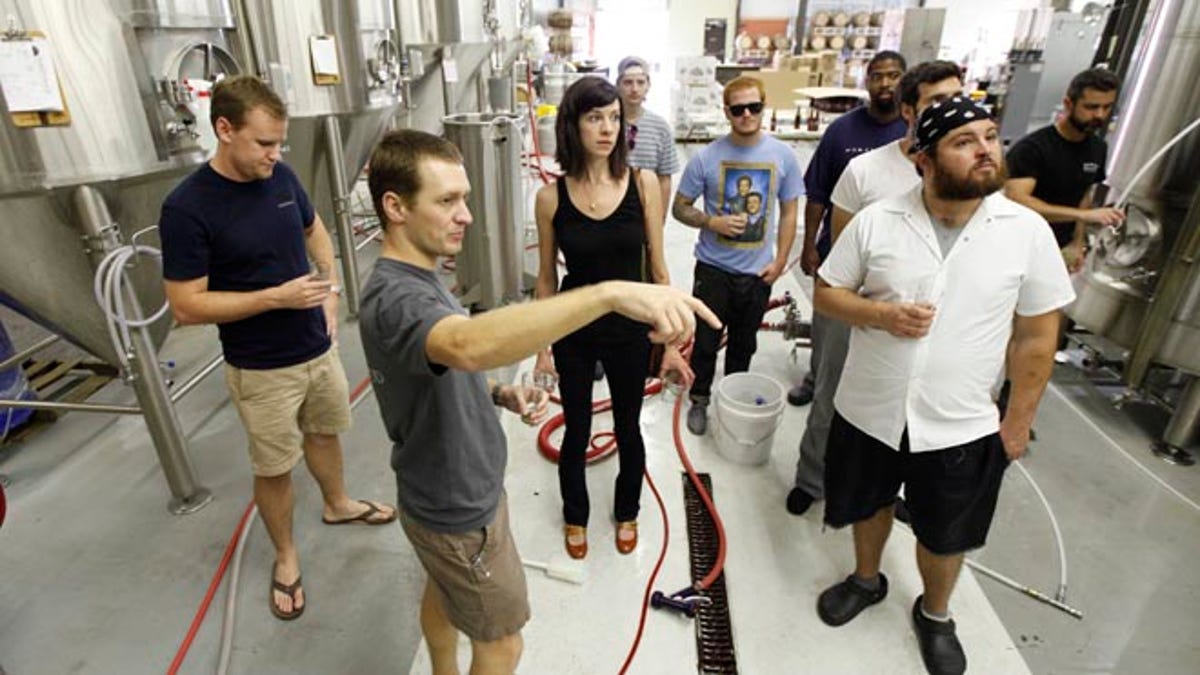
Aug. 20, 2012: Hardywood Park Craft Brewery President and co-founder, Eric McKay, second from left, and brewmaster Patrick Murtaugh, left, talk to a tour group. (AP)
RICHMOND, Va. – From industrial outskirts of Richmond to the pastoral landscapes of the Blue Ridge Mountains and beyond, an army of artisans are turning their love of beer into business.
Armed with an arsenal of barley and hops, these craft brewers are looking to cash in on a growing interest in all things local, including alcoholic libations. And recent changes to state law are helping craft brewers grow their business.
With about 40 craft breweries in the state, Virginia pales in comparison to states like California, Oregon and Colorado. But craft brewers in Virginia hope to build on the success of the state's wine industry, which has seen steady growth in recent years and continues to attract tourists seeking to enjoy the concoctions made by Virginia craftsmen.
For the first time, the state — named by the Travel Channel as one of the Top 7 beer destinations in North America — has designated August as Virginia Craft Beer month, highlighted by events at breweries, including a statewide festival and competition Saturday at the award-winning Devils Backbone Brewing Company in Nelson County.
"It's exciting right now. ... There's been a real movement in the last five years," said Mike Killelea, chairman of the Virginia Craft Brewers Guild and a brewer at Richmond's Legend Brewing Co. for more than five years. "Within about two years, you're probably going to have a brewery within a short drive of pretty much every citizen in the commonwealth. ... My hope is that people become more aware of the great beer scene here."
With more than 2,125 breweries nationwide, craft brewers make up a nearly $9 billion industry and provide about 104,000 jobs across the country, according to the Brewers Association, the trade group representing the majority of U.S. brewing companies. And the industry, which sold about 11.5 million barrels of beer in 2011, has seen volumes grow 13 percent compared with 2010. By comparison, the overall U.S. beer market is estimated to be a $96 billion industry and sold nearly 200 million barrels of beer last year.
Larger brewers are even trying to capitalize on the craft brew craze. Anheuser-Busch this summer introduced a beer named for the 23185 ZIP code, where the brewmaster at its Williamsburg facility created the small-batch beer as part of a new Budweiser program called "Project 12." The project created small-batch beers at 12 of its breweries. After being pared down to six, consumer feedback will help pick the beers to be included in a limited-edition sampler pack this fall.
"Craft brewers have become known for their innovation, so they take old world beer styles and have pushed the envelope — packing more flavor ... and doing modern twists on classic styles that often now have created completely different new world styles of beer," said Julia Herz, the craft beer program director at the Brewers Association.
While the number of craft breweries is expected to grow in Virginia and nationwide, the startup can be a difficult road, Herz said. But the reward of taking something they love and turning into a business comes in the form of a pint glass.
"Being a brewer is their version of the American dream," Herz said. "That American dream ... is extended to for many, that 'Hey, I want to be in a business, pay my bills, be creative and be a positive influence on the community around me.'"
Killelea and the staff at Legend, which opened in the early 1990s, have helped pave the way for younger breweries. Changes in state law that went into effect in July now allow craft breweries to sell their products by the pint in their taprooms rather just bottled for retail sales also are helping brewers bring in more revenue. Social media also has made it easier to promote brands, and distributors have become more craft-beer savvy, he said.
Patrick Murtaugh and Eric McKay opened Hardywood Park Craft Brewery in Richmond last October, hoping to capitalize on the area's population growth, large number of independent restaurants, emphasis on local products and an interest in adventurous activities like kayaking, mountain biking and hiking. Since then, they've begun to ramp up production of more than a dozen beers — some hand-bottled and sold commercially, others only to be enjoyed on tap at the brewery.
Thanks to the changes in state law, the brewery went from being able to only serve small samples their beers four times a year after getting state Alcohol and Beverage Control permits, to opening up a tasting room, hosting several events to premiere new styles and gathering local food trucks for evening festivals with food, beer and music.
They've also placed an emphasis on using local ingredients like hops, honey and berries, which often come at a premium cost.
"While the economics don't always make sense from a sheer business standpoint, (consumers are) willing to pay just a tiny bit a more to have something that helps in other ways to support the local economy while showcasing the creativity and passion of others," McKay said.
According to Murtaugh, financial concerns haven't always been at the center of the craft brewing industry.
"(It's) one of those things that most likely has started in a kitchen somewhere or on a back porch like it has for us," he said.
"I always tell people it's sort of a hobby that's gotten out of hand."
